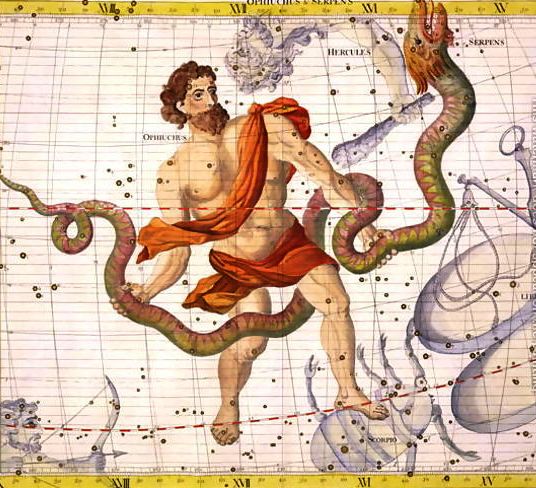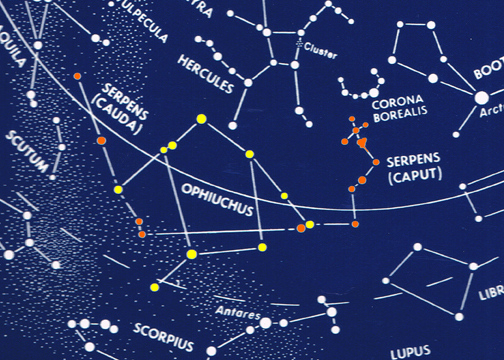The Head of the Serpent
by Peter Krüger
©2013
[Germanic Astronomy]

In Hauksbók (H47) we find a stanza not preserved in Codex Regius:
|
Gínn lopt yfir
|
In the air above the girdle of the earth gape the jaws of the terrible worm; (Thorpe translation) |
This stanza is very unclear and much debated. It mentions an 'ormr'. The word 'ormr' is used several times in Völuspá. In the essay on Nár the Deadman, I identified the orm in other stanzas as the constellation Serpens, e.g. the `orma hryggjum as the part of Serpens forming the bottom of Ophiuchus. Is it possible to prove that the stanza above also refers to Serpens? Once again it might be helpful to compare the description to the Phainomena of Aratus of Soli (270 BC):
|
[74] To his back the Crown is near, but by his head See the Snake-holder's head, and then from it You may behold his shining form itself: So high the gleaming shoulders 'neath his head Appear. These even when the Moon is full Can be beheld. The hands are quite unequal; For febble glitter flickers here and there. Yet notless they are seen, since they are large. Both of then grasp a snake, which round the waist Of the Snake-holder twine; but he well-fixed With each foot presses on a monster huge, The Scorpion, o'er eye and breast-scale standing Upright, the Snake, meanwhile, in both hands writhing; Less in the right, most holds the left on high. By the Crown's side the jaw-end lies along; Beneath the coils search for the mighty Claws, But they are scant of light and nothing fair. [Done into English verse by Robert Brown, 1885] |
 |
It's also interesting that Aratus uses the Crown, Corona Borealis, to locate Serpens Caput. If this serpent is the same as the one hung above the bound Loki, than it might be the cup used by Sigyn to collect the poison dripping out of the mouth of the serpent.
|
Loki and Sigyn by M.E. Winge |